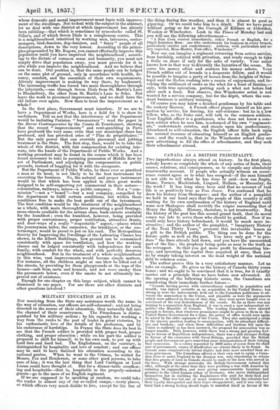MILITARY EDUCATION AS IT IS.
Nor receiving from the State any assistance worth the name in the way of education, our officers are self-educated ; and not being directed in the course of their education, they naturally. fall into the channel of their countrymen. The Frenchman is distinguished by his military ardour ; by his capacity for working a way from the ranks to the post of leader in great victories, by his enthusiastic love of the details of his profession, and by his endurance of hardships. In France the State does its best to see that the French soldier is provided with proper food, proper clothing, and proper education ; while on his part the soldier is prepared to shift for himself, to be his own cook, to put up with hard fare and hard bed. The Englishman, on the contrary,is distinguished by hospitality and love of comfort ; and our officer may be said to have finished his education according to the national genius. When he went to the Crimea, he waited for Messrs. Fox and Henderson, or some other good persons, to take care of him ; it was the last thing that Lord Cardigan or Lord Luella could have thought of. But for a dinner-table overflowing and hospitable--that is, hospitable to the properly-selected guests—go to the mess of an English regiment.
If we are supposed to be speaking at random, we could take the reader to almost any of our so-called camps,—nasty places at which officers very much dislike to live, except for the fun of
the thing during fine weather, and then it is almost tis good as gipsying. Or we could take him to a depot. But we have proof without going so far as the Curragh of Kildare or _Aldershot, Weedon or Winchester. Look in the Times of Monday last and you will see the following advertisement— "A Mau Cook wanted immediately, either French or English, for a Dip& Battalion Mess : one who understands his business in every bninch, particularly entrées and confectionary. Address, with particulars and sa lary Mess-Master, Post-office, Winchester."
Now one can imagine a regiment returning from active service, from hardship, satiated with privation, and ready enough to take a frolic on shore if only for the sake of variety. Your sailor knows how in that way to diversify the luxuries of the ocean. He earns his money afloat and wafters his money ashore. Your French soldier out of bounds is a desperate fellow? and it would be possible to imagine a party of heroes from the heights of Sebastopol and the Roden rushing into a razzia of enjoyments, and invoking the sublimest of cooks as the whet for a feast of famine,— only, with true epicurism, putting such a whet not before but after such a feast. But observe, this Winchester artist is not wanted for a service company, but for the depOt, where the constant business is military training.
Of course you may know a finished gentleman by his table and the cookery thereon. A French officer piques himself on his promotion by service, his fencing, his sell-reliance: but he is a low fellow, who, as the Duke said, will talk to the common soldiers. Your English officer is a gentleman, who does not know a common soldier when he sees him, is ashamed of his own "regimentals," understands entrees, and stands upon his confectionary. Abandoned to self-education, the English officer falls back upon the natural recourse of educating himself as an English gentleman; and the result is, that in the Winchester school they are now advertising to fill the office of schoolmaster, and they seek their schoolmaster abroad.


























 Previous page
Previous page